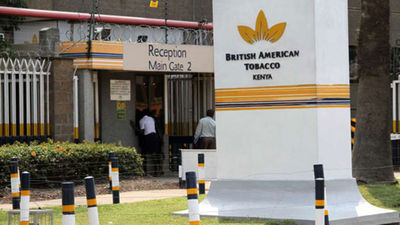Investigations
How British American Tobacco Conducted Extensive And Potentially Illegal Activity To Undermine Health Policy, Sabotage Competitors And Secure Profits In Kenya And Africa

Contributor,
New York, USA, Sept 15 – Two new analyses of whistleblower documents and court records by the Tobacco Control Research Group at the University of Bath and published by STOP, a global tobacco industry watchdog, suggest that British American Tobacco PLC (BAT) allegedly used payments to dozens of individuals and potentially unlawful surveillance to tighten its already crushing market grip on Africa.
The reports—one on the company’s activities in several East and Central African countries, another on its aggressive tactics in South Africa—reveal that BAT appeared to be operating “as if it were above the law,” according to the report on South Africa, to sell cigarettes to Africans—products known to cause tobacco-related illness, death and economic harm—across the region.
Evidence appears to connect BAT to hand-delivered cash, cars, per diems and campaign donations to dozens of politicians, civil servants, journalists as well as people working at competitor companies.
The payments may have helped secure influence on health policies in key African countries. Documents also provide evidence that suggests, in South Africa, BAT hired private contractors, under the pretense of anti-smuggling efforts, to carry out military-style surveillance and operations to disrupt its competitors.
Commenting on the reports’ findings, Akinbode Oluwafemi, President of the African Tobacco Control Alliance, said: “BAT’s behavior is a reminder of the tobacco industry’s deep colonialist roots, showing contempt for African laws, business and trade and the health and well-being of Africans. Then and now, the tobacco industry seeks to exploit Africans for its own profit with no consideration for the harm it causes.”
“Our analysis shows that BAT’s potentially corrupt practices in Africa were not just the work of a few bad apples,” said Andrew Rowell, Senior Researcher, Tobacco Control Research Group at the University of Bath, a partner in STOP.
“The geographic spread of the activity, the infrastructure used and the number of senior staff involved suggest that BAT’s payments were routine, with the evidence trail frequently leading back to BAT’s London headquarters. This is not the kind of company any government should leave unregulated or fail to investigate.”
“Buying Influence and Advantage in Africa: An Analysis of British American Tobacco’s Questionable Payments” is based on leaked documents—including internal emails and invoices—and court affidavits from two former employees-turned-whistleblowers. It details BAT’s activities between 2008 and 2013 across 10 Central and East African countries. ““British American Tobacco in South Africa: Any Means Necessary” is based on leaked company documents, whistleblower testimony and court documents from litigation in South Africa.
Buying Influence and Advantage in Africa: Evidence from 10 Countries;
In January 2021 the U.K. Serious Fraud Office (SFO) concluded its five-year investigation into alleged bribery by the company and its employees, citing that there was not enough evidence to support prosecution as defined under the U.K. Code for Crown Prosecutors, while further stating that: “The SFO will continue to offer assistance to the ongoing investigations of other law enforcement partners.”
Analysis of whistleblower documents connected to BAT’s work in East and Central Africa revealed evidence of questionable payments made in Burundi, Comoros, the Democratic Republic of Congo, Kenya, Malawi, Rwanda, Sudan, Tanzania, Uganda and Zambia. Researchers identified 236 payments made between 2008 and 2013 totaling US $601,502 that were allegedly used to try to influence policy and sabotage competitors.
Researchers categorized payments into two categories: those “raising questions under the United Kingdom Bribery Act (UKBA)” and another less serious but still suspicious group of payments “warranting further investigation under the UKBA.”
The payments included:
- More than $28,500 to sources within the Kenya Revenue Authority and more than $38,500 to a former Justice Minister, allegedly in exchange for intelligence and for assistance with BAT’s efforts to prevent SICPA from winning the tender over Codentify.
- $20,000 to the chair of a Ugandan parliamentary committee to allegedly “amend” a report related to an investigation into Continental Tobacco Uganda.
- An offer of $110,000 to an executive of Leaf Tobacco and Commodities Ltd. of Uganda, allegedly in exchange for evidence of potentially illegal activities by the company. A document detailing the proposal appears to include an offer to arrange an “immunity from prosecution agreement.”
- Roughly $56,000 to a private contractor, allegedly to covertly establish a trade union and orchestrate labor unrest at a competitor, Mastermind Tobacco Kenya. The effort was dubbed “Operation Snake.”
- Support for “Operation Deep Jungle,” allegedly to establish a permanent informant at a rival company, Japan Tobacco International.
The documents suggest that BAT often routed payments through third-party companies referred to as “service providers.” They also show that BAT staff in London appear to have been involved in requesting and authorizing payments, processing invoices and approving service-provider contracts. Some employees seemed to know they were involved in questionable activities as they used aliases and private email accounts when communicating.
–BAT in South Africa: Crossing the Line and Covering its Tracks–
Analysis finds that to solidify BAT’s tobacco monopoly in South Africa, BAT and a private contractor may have repeatedly crossed the line of legality to undermine competitors and disrupt operations. It further alleges that:
- BAT oversaw two networks of paid informants that operated under the guise of anti-illicit trade monitoring. Analysis suggests the strategy was anti-competitive, not anti-smuggling, with a goal of disrupting the illegal and legal operations of BAT South Africa (BATSA)’s competitors.
- BAT appeared to try to distance itself by hiring a private contractor to run its disruption campaign, and both tried to cover their tracks by paying informants via shell companies and untraceable Travelex cash cards. The informant operations were approved at BAT’s head office and run by London-based operatives.
- BAT appears to have influenced the activities of state agencies (“state capture”), including law enforcement, to help it carry out its espionage.
–Working with state agencies while allegedly complicit in smuggling–
While BAT gained access to state agencies, ostensibly to help fight illicit trade, and issued public statements to say that it supported government efforts to eradicate the problem, BAT cigarettes produced in South Africa were allegedly being smuggled into West Africa, fueling conflict, organized crime and political instability.
“BAT operates in more than 170 countries and the involvement of head office staff and executives in the activities highlighted in these reports raises questions about its business practices beyond Africa,” said Gan Quan, Director of Tobacco Control at The Union, a partner in STOP.
“We urge anyone with information about potentially illegal activities to come forward and for regulators to take a hard look at this company and how it behaves. Governments and consumers have every reason to be suspicious.”
Kenya Insights allows guest blogging, if you want to be published on Kenya’s most authoritative and accurate blog, have an expose, news TIPS, story angles, human interest stories, drop us an email on [email protected] or via Telegram
-

 Grapevine2 days ago
Grapevine2 days agoAlleged Male Lover Claims His Life Is in Danger, Leaks Screenshots and Private Videos Linking SportPesa CEO Ronald Karauri
-

 Lifestyle5 days ago
Lifestyle5 days agoThe General’s Fall: From Barracks To Bankruptcy As Illness Ravages Karangi’s Memory And Empire
-

 Americas2 weeks ago
Americas2 weeks agoEpstein Files: Bill Clinton and George Bush Accused Of Raping A Boy In A Yacht Of ‘Ritualistic Sacrifice’
-

 Business2 weeks ago
Business2 weeks agoCooking Fuel Firm Koko Collapses After Govt Blocks Sh23bn Carbon Deal
-

 Business2 weeks ago
Business2 weeks agoABSA BANK IN CRISIS: How Internal Rot and Client Betrayals Have Exposed Kenya’s Banking Giant
-

 Investigations7 days ago
Investigations7 days agoEpstein Files: Sultan bin Sulayem Bragged on His Closeness to President Uhuru Then His Firm DP World Controversially Won Port Construction in Kenya, Tanzania
-

 News1 week ago
News1 week agoAUDIT EXPOSES INEQUALITY IN STAREHE SCHOOLS: PARENTS BLED DRY AS FEES HIT Sh300,000 AGAINST Sh67,244 CAP
-

 Business1 week ago
Business1 week agoKRA Can Now Tax Unexplained Bank Deposits
















